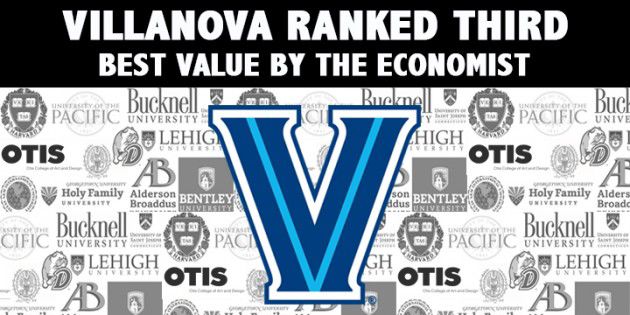Villanova ranked third best value by The Economist
November 4, 2015
Students were excited to hear that the University has been ranked third out of all four-year non-vocational American colleges based on economic value.
Provost Patrick Maggitti shared with the Villanovan how he wasn’t surprised by the rankings from the Economist and how the University stands out from other institutions.
The Economist had never published college rankings before, in an effort to avoid the “simplistic, reductive college rankings […] which wield ever-growing influence over where students attend.”
The publication used a new method for its rankings, calling upon new information provided by the United States Department of Education.
This methodology allowed The Economist to see alumni demographic characteristics and qualifications before they entered college as students and compare them with their earnings ten years after graduating.
Ultimately this reveals the gap between how much money alumni are currently making and how much they would have made studying at another university.
Maggitti shared that this ranking will significantly impact the upcoming admissions season when prospective students can see the value of their tuition.
Maggitti states on behalf of the University that, “We are very cognizant that tuition is very expensive and that our students and their parents make sacrifices to pay that tuition to come here. It is a big investment.We are now showing that we are adding value to every student and that you will be getting your money’s worth.”
In a follow-up article published by The Economist, they mentioned the University several times, saying, “For students who want a broader curriculum, Villanova, which accepts half its applicants, has mandatory courses on professional development, close ties to big accounting firms and top-tier graduate salaries.” Students experience this on a day-to-day basis within the curriculum of their classes and visits to the incredible career center.
All of the schools within the University have course requirements that make sure each student is equipped with communication and writing skills that are necessary in the real world.
When it comes to the well-rounded nature of a ‘Nova student, Maggitti owes this to the fact that, “We don’t just learn in the classroom, we are very concerned about linking the theory in the classroom to the practice in the field.”
There is professional development that is interwoven in the classwork in all of the schools such as interview skills, resume writing, and giving presentations.” The University prides itself in “baking” these skills into their courses so that each student has the skills to excel. At other universities, the professional development has to be searched for and happens outside of the classroom.
What stood out to many Economist readers was that the University and other similar schools were ranked above Ivy-League universities. For many students and faculty of the University, this did not come as a surprise. Maggitti also believed that it was not surprising that ‘Nova was ranked above these schools that are traditionally considered of higher level.
He states, “Former Villanovans are always eager to help other Villanovans in the workplace more so than alumni from any other university.”
He believes this stems from the unique nature of the community—students interacting in a competitive atmosphere while constantly striving to build their peers up, developing an extremely beneficial alumni network.
Although the University has acted as a national university for around 30 years, the possibility of shifting from a regionally ranked school to a nationally ranked school has only been recently discussed.
In order to make this change, the University is increasing the number of Ph.D. students. Should the University be nationally ranked, University officials expect to land a spot among the top 50 schools in the country.
Maggitti pointed out that “It is important to understand that Villanova does not strive to improve itself in order to boost its rank, but strives to improve for the students. However, it is helpful for prospective students to see these rankings as I’m sure every current student had looked at them their senior year of high school going through that process.”











